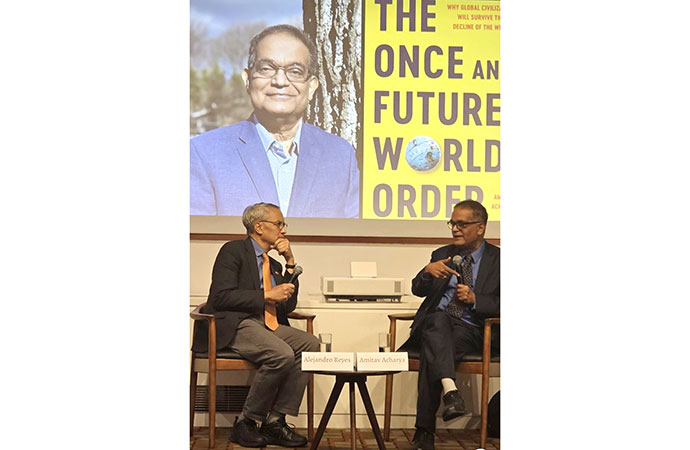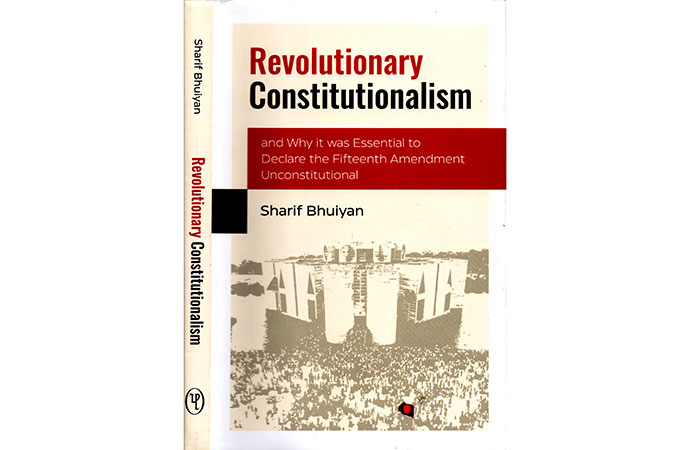Column

Photo: Collected
Amitav Acharya, Distinguished Professor of International Affairs at American University, has written a new book that offers unconventional thoughts about what is fast becoming a platitude: the decline of the West as the global hegemon. The Once and Future World Order: Why global civilization will survive the decline of the West (Basic Books, New York, April 2025) argues that, instead of clinging to the vanishing certainties of the 20th century, global citizens should embrace the liberating possibilities of the 21st century.
That is because Western supremacy has contributed to a global order characterised by instability, injustice and disorder, a condition that "might be eased by its decline". The result need not be anarchy at all but an opportunity for non-Western civilisations to reassert themselves in the contemporary world by redeploying their historical contributions, made in the form of workable mechanisms for peace, cooperation and morality. Indeed, the book shows that, "for most of history, China, India and the Islamic world have been forceful actors on the world stage, that power has been dispersed among different blocs, and that cultural pluralism has been widespread". Western dominance "violated these norms" and "it will actually be good for everybody to restore them".
Yes, but will world order prevail in the process? Acharya defines the term "world order" as "the way the world, or a large chunk of it, is organized politically, economically, and culturally and how power structures, economic links, political ideas, and leadership work with the aim of ensuring the stability and peace of humankind". World order has existed before these times. The author substantiates his claim about the rich diversity of historical contributions to world order by embarking on a comparative study of Mesopotamian, Greek, Persian, Indian, Chinese, Roman, Islamic, Mongol, Mayan, Aztec, Incan, African, Native American, European and American civilisations. These forays into world history form the bulk of this sizeable book, which is more than 450 pages long.
Acharya studies as well 20th-century responses to imperialism, colonialism and racism, especially in the form of the Bandung Conference of 1955 and the vitality of the consequent Non-Aligned Movement, which sought to distance the Third World from the West and the Soviet Union equally. Although Washington and Moscow were ideological adversaries, both functioned within a Western calculus that they held in common, a network of war-prone assumptions, norms and practices which effectively denied the countervailing agency of the non-West. Acharya's book restores that non-West to its stolen place in unfolding history.
Now, what Acharya foresees is a multi-civilisational world order without a dominant global power and one that is not multipolar either, "where a handful of competing great powers shape security and order on a global scale". Rather, he envisages a "global multiplex" in which "large, medium and some innovative smaller nations, as well as people acting through governments, companies, and civil groups powered by social media and employing new forms of interdependence and interactions will shape world order".
This is a compelling vision of coming times. That is so especially because Acharya has laid to rest, I hope forever, Francis Fukuyama's juvenile thesis about the end of history following the end of the Cold War, a historical ending that would supposedly install Western liberal democracy as the only viable yardstick of political action and human development around the fractious world. That theory was suspect at its inception and has been disproved by international trends and events since the fall of the Berlin Wall in 1989 and the unravelling of the Soviet Union in 1991.
Yet
However, Fukuyama's thesis was challenged by Samuel Huntington, who warned about a clash of civilisations after the West's euphoric victory in the Cold War had been normalised by the unsentimental flow of history. Hence, Acharya's job in this book is to lay Fukuyama's end of history to well-deserved rest and to disprove Huntington's historical angst at the same time. The first part of the job is achieved admirably; the second part less so.
That is because, as Heraclitus observed, "No man ever steps in the same river twice, for it is not the same river and he is not the same man". What the philosopher means is that change is constant for both a flowing river and a living man. It is the same for civilisations. Like men, they do not remain constant because the times change and civilisations, too, change. While the historical orders that Acharya cherishes did flourish in their time, they are either extinct or not the same today. Mesopotamian, Greek, Persian, Roman, Mongol, Mayan, Aztec, Incan, African and Native American cultures have disappeared as civilisational forces. Indian, Chinese, Islamic, European and American cultures persist as civilisations but they are not recognisable any more given their inceptions and historical evolution.
Instead, what the world order is based on is a globalised paradigm that draws from the Treaty of Westphalia of 1648. The Westphalian order is not based on divine sanction. (It appeared when Europe was religiously exhausted by the intramural Thirty Years War.) The Westphalian order is horizontal and not hierarchical (like China's tributary system); it is also not a concentric yet shifting system of power emanating from an imperial centre, as conceptualised in India's classical mandala system; and it is not based on the divine provenance of Islamic order. Instead, the European Enlightenment and the American Revolution secularised and democratised the very sense of global order while admittedly introducing into it the vicious ills of colonialism, racism and barbaric economic domination (witness the Bengal Famine of 1943).
While Acharya's new world is an exciting prospect, it remains to be seen whether his revived Sinic, Indic and Islamic orders (with the addition of a defensive West and a resurgent Russia) will surmount the times that they will inherit, times derived from the worst aspects of the Westphalian system, and whether they will revert to the best instincts that drove their rise to power centuries ago. Civilisations, like humans, do not enter the same times twice.
Acharya's book constitutes an admirable addition to the effort to imagine a future that is worth inheriting. I hope that the future lives up to his claims.
The writer is Principal Research Fellow of the Cosmos Foundation. He may be reached at epaaropaar@gmail.com

























Leave a Comment
Recent Posts
Religion and Politics: A Toxic ...
At Dhaka University, cafeteria workers have been told not to wear shor ...
Enayetullah Khan joins AsiaNet ...
AsiaNet’s annual board meeting and forum was held in Singapore, ...
In a New York minute
Many leaders back a UN call to address challenges to ..
Defaulted loans at Non-Bank Financial Institutions ( ..
How the late Zubeen Garg embodied cultural affinitie ..